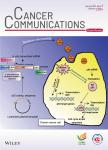Combined local therapy and CAR-GPC3 T-cell therapy in advanced hepatocellular carcinoma:a proof-of-concept treatment strategy
作者机构:Department of Interventional OncologyState Key Laboratory of Systems Medicine for CancerRenji HospitalShanghai Jiao Tong University School of MedicineShanghaiP. R. China Shanghai Cancer InstituteState Key Laboratory of Systems Medicine for CancerRenji HospitalShanghai Jiao Tong University School of MedicineShanghaiP. R. China CARsgen Therapeutics Ltd.ShanghaiP.R.China
出 版 物:《Cancer Communications》 (癌症通讯(英文))
年 卷 期:2023年第43卷第9期
页 面:1064-1068页
核心收录:
学科分类:1002[医学-临床医学] 100214[医学-肿瘤学] 10[医学]
基 金:This clinical study(NCT02395250)was supported by the Research Fund of the State Key Laboratory of Oncogenes and Related Genes(91-15-04) the Program of Shanghai Subject Chief Scientist(No.16XD1402600) the National Natural Science Foundation(Nos.81502672,82222047,82073039,and 82070619) the Program of Shanghai Academic/Technology Research Leader(No.22XD1423100) the Shanghai Science and Technology Innovation Action Plan(No.16DZ1910700) Shanghai Science and Technology Commission Grant(No.23ZR1439000)
主 题:neoplasms hepatocellular treatment
摘 要:Dear Editor,Available evidence regarding the most suitable treatment strategies for hepatocellular carcinoma(HCC)with inferior vena cava tumor thrombus(IVCTT)is extremely limited,and the median overall survival time for these patients after liver resection is only 17.76 months[1].Other local or systemic treatments for HCC with IVCTT result in a median overall survival time ranging from 5.88 to 15.36 months[1–3].Thus,new therapeutic strategies are urgently needed to improve the survival of HCC patients with *** antigen receptor(CAR)T-cell therapy has seen success in treating B-cell neoplasms with impressive outcomes[4].However,this therapy alone has shown limited efficacy on solid tumors,such as HCC[5].



